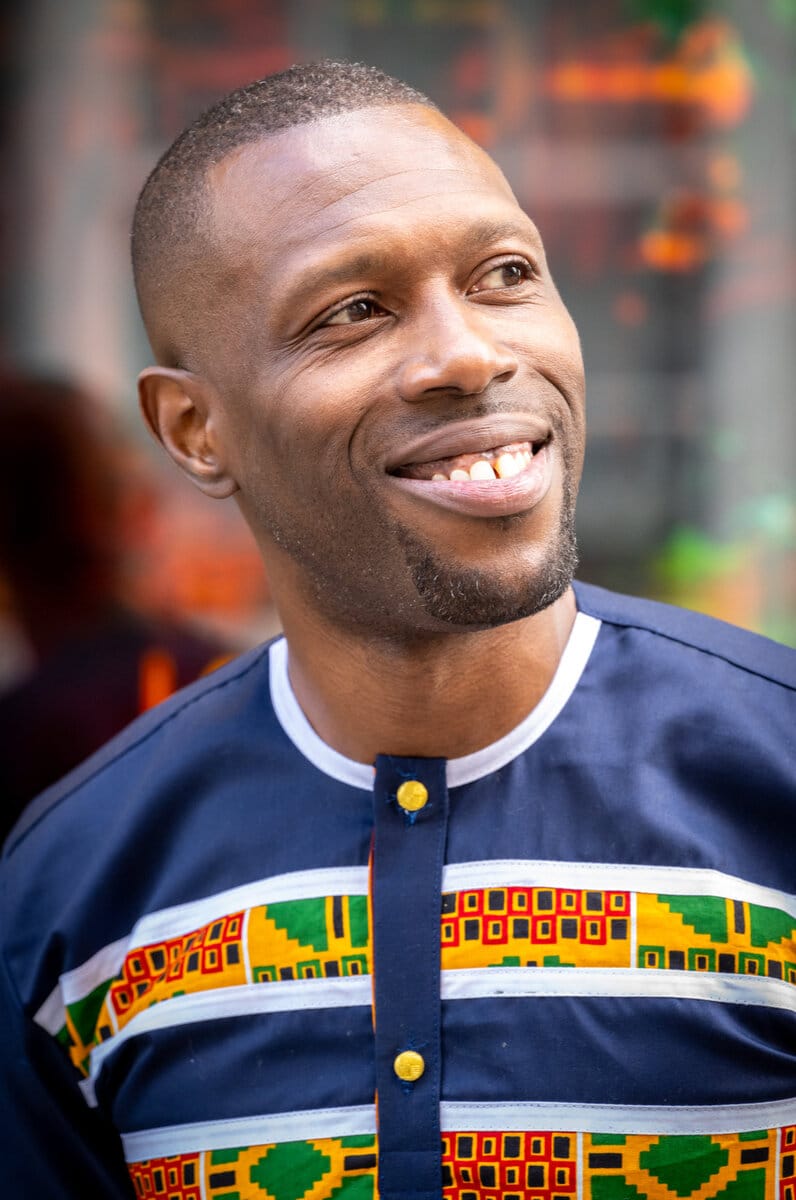The Intersection Welcome: Setting the Stage for Authentic Transformation

A Black, gay, neurodivergent person stands tall in a futuristic cityscape, with beams of light representing race, gender, neurodiversity, and culture converging into a radiant prism.
Hey Changemakers!
Welcome back to The Intersection—your destination for confronting mental health myths and pioneering personalised solutions that centre your lived experiences. Today, we are shattering the 'one-size-fits-all' myth in mental health care, particularly for those navigating multiple intersecting identities like race, gender, neurodiversity, and culture.
I know firsthand that traditional frameworks often miss the mark—they treat individuals as monolithic, failing to address the unique ways our identities interact with the world. A UK study found that individuals from marginalised communities, particularly Black respondents, were significantly less likely to access mental health services compared to White respondents, even when they had similar mental health needs. This gap in care highlights how traditional models fail those at the intersections of multiple marginalised identities (Hatch et al., 2020).
That’s why we’re here. It’s time for mental health care that doesn’t just see fragments of you, but embraces the full spectrum of who you are. ICC™ isn’t just another buzzword; it’s a lifeline—a revolutionary approach that honours your unique intersectional identity, empowering you to heal in ways that are as multifaceted as you are. We aren’t boxes to be checked—we are full, complex beings who deserve care that reflects our true selves.
Empowering the Next Generation of Entrepreneurs: My Journey from Winner to Mentor to Judge

A radiant prism refracts beams of light representing race, gender, neurodiversity, and culture in a sleek, futuristic cosmic landscape.
Winning the LCCI SME London Business Person of the Year 2024 was not just a personal triumph—it was an affirmation of everything I stand for. The award is a testament to the power of resilience, authenticity, and the importance of embracing our intersectional identities. My journey as a Black, gay, neurodivergent man navigating both business and mental health spaces is one that I now use to inspire and uplift others.
After my win, I had the honour of hosting two masterclasses for the London Chamber of Commerce and Industry (LCCI), where I shared strategies for achieving success while staying true to one’s values. Through these sessions, I guided other entrepreneurs on how to align their business goals with the impact they wish to create—reminding them that their identities are not a hindrance, but their greatest asset. As I explain in my book, embracing our true selves is the key to unlocking our full potential. Our differences are our strengths—that’s where the real magic happens.
Today, my journey has come full circle. As a judge for the SME London Business Awards 2025, I now help recognise businesses that prioritise resilience, inclusion, and cultural consciousness. I judge not just from the lens of professional success but from a place of deep empathy, knowing firsthand what it means to rise above systemic challenges. Through my story and my work, I hope to empower others to step into their own superpower.
The Heart of the Matter: Unpacking the Realities Behind Mental Health Care

A crumbling wall of systemic barriers with diverse figures walking through, illuminated by beams of light symbolizing empowerment and inclusive care.
The current mental health care system is not designed to serve everyone equitably. For those of us with intersecting identities, the gaps in care are glaring. Research shows that individuals from marginalised communities are 40% more likely to feel underserved or misunderstood by traditional mental health services. These aren’t just statistics—they’re lived experiences. They’re my story.
In the UK, mental health disparities are particularly stark for transgender people of colour, who experience significantly higher rates of mental distress and depression compared to their White cisgender counterparts. For example, transgender individuals of colour are three times more likely to experience frequent mental distress than their White counterparts(Robertson et al., 2021).
In my book White Talking Therapy Can’t Think in Black, I discuss the systemic racism, cultural ignorance, and societal barriers that pervade the mental health care system. But more importantly, I highlight the path forward: culturally conscious care is not just an option—it’s a necessity. We cannot continue to ignore the full identities of those we seek to heal. We must recognise the beauty of intersectionality, because true healing happens when every part of us is seen.
Looking for unbiased, fact-based news? Join 1440 today.
Upgrade your news intake with 1440! Dive into a daily newsletter trusted by millions for its comprehensive, 5-minute snapshot of the world's happenings. We navigate through over 100 sources to bring you fact-based news on politics, business, and culture—minus the bias and absolutely free.
Beyond the Surface: Shifting from Generic Care to ICC™

A glowing river of light cuts through a grey stone landscape, transforming it into a vibrant scene of cultural diversity and personalized care.
'Diversity' alone is not enough to address the deep-seated biases that exist in therapy. Research underscores how institutional barriers, such as not being believed or heard due to social status or background, discourage marginalised individuals from engaging with formal mental health services. This perpetuates systemic inequalities in care and further harms mental health(Hui et al., 2021).
ICC™ moves beyond the one-size-fits-all model. Like a river cutting through stone, it carves out a new path—a path that is flexible, inclusive, and personalised. This is the future of mental health care, and it’s one that sees individuals not just as patients, but as whole, complex beings deserving of care that meets them where they are. It's time we stop treating people as checkboxes and start seeing them in their full, radiant complexity.
ICC Insights: Personal Stories and Lessons from the Field
Let me share a few real-world stories from individuals who have experienced the power of culturally conscious care through ICC™:
Testimonial from an Entrepreneur:
"Therapy with Jarell Bempong was transformative, deeply acknowledging my cultural identity. Each session was enriched with psychoeducation, providing insights and resources that effectively guided my personal growth. Jarell’s commitment was profound, equipping me with comprehensive insights and reports that continue to shape my journey. I emerged empowered and deeply enlightened."Testimonial from a Psychotherapist:
"It was additionally beneficial to engage in therapy that recognised and honoured my intersectional identity. Jarell's culturally conscious approach addressed my experiences and the complex interplay of cultural and societal factors that shape them. This cultural connection profoundly deepened the therapeutic process, making it more relevant and impactful."
These testimonials, like my own journey, highlight the power of culturally conscious care. When care meets culture, transformation is inevitable.
Challenge the System: Your Call to Action

Diverse figures walk beyond a shattered structure, with beams of light symbolizing empowerment in a futuristic, inclusive landscape.
Is your mental health care truly inclusive? Are you still operating within the confines of a 'one-size-fits-all' framework? If so, it’s time to break free. Imagine what could happen if we all embraced our full identities and received care that reflects our true selves. Step beyond the old paradigm and explore ICC™ as a model for real, sustainable change.
Breaking the Cycle: Moving Beyond Generic Care
The ICC™ Framework offers more than just a solution—it’s a blueprint for dismantling outdated systems that have failed to serve us for far too long. Generic mental health solutions don’t just fall short—they actively exclude those of us with intersecting identities. It’s time to break this cycle once and for all.
Take, for example, one of my recent clients, a Black woman navigating the intersection of racial trauma, gender bias, and corporate burnout. Traditional therapy frameworks labelled her experience as simply "workplace stress," without considering the compounded impact of her race and gender. By applying the ICC™ Framework, we moved beyond the generic diagnosis. Through culturally conscious care, we were able to address not just her immediate stress, but also the deep-rooted, systemic issues that had been contributing to her mental health struggles for years. The result? A 180-degree shift in her emotional well-being, confidence, and empowerment. She didn’t just recover—she transformed. She left behind a career that wasn’t serving her and pursued her passion, now thriving both personally and professionally.

A Black woman stands confidently as a crumbling corporate structure behind her symbolizes the breaking of racial trauma, gender bias, and burnout. Vibrant beams of light and futuristic elements represent empowerment and personal transformation.
ICC™ goes beyond surface-level improvements. It’s about tearing down the systemic barriers that have kept marginalised communities on the sidelines of care, replacing them with tailored, culturally conscious support that recognises and values the whole person. We’re not just looking to improve the system; we’re here to revolutionise it—to create a world where every identity, every lived experience, and every story is seen, heard, and honoured.
The future of mental health care demands that we move away from the one-size-fits-all approach. This is about creating systems that work for everyone, that respect the full spectrum of human identity, and that empower each individual to step into their superpower. This is more than change—it’s a transformation.
The Future of Intersectionality: Where Healing Meets Innovation

As Dr. Lisa Coleman rightly said, "Belonging unlocks innovation." When we approach mental health care through the lens of intersectionality, we don’t just treat people; we empower them. ICC™ is leading the charge in this new era, showing that the future of care lies in honouring the full spectrum of our identities.
The Power of Embracing Intersectionality
My personal journey, the insights from my book, and the work I do with ICC™ all point to one clear truth: our intersectional identities are not obstacles to be overcome—they are superpowers to be embraced. The time for a one-size-fits-all model of care is over. Now is the time for personalised, culturally conscious care that empowers, heals, and transforms lives.
I’m Jarell Bempong, an award-winning mental health innovator, bestselling author, and the proud founder of Bempong Talking Therapy. As a Black, gay, neurodivergent English-Ghanaian man, I’ve spent years overcoming the systemic barriers that often exclude those with intersecting identities. My journey, both personal and professional, has been dedicated to revolutionising mental health care through Intersectional Cultural Consciousness™ (ICC™)—an approach that ensures everyone is seen, heard, and empowered. My work is about more than just healing—it's about transforming lives, one story at a time.




